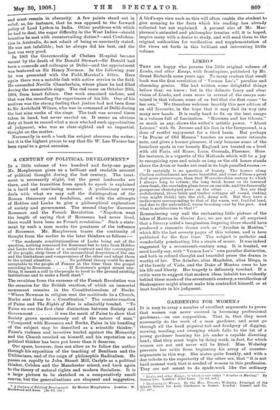LIMBO.*
THEY are happy who possess the little original volume of Limbo, and other Essays, with frontispiece, published by Mr.
Grant Richards some years ago. To many readers that small book was the first revelation of "Vernon Lee's" peculiar and charming genius. She had written some delightful things before that, we know ; but in the delicate fancy and clear
vision of Limbo, and even more in several of the essays con- tained in that volume, some of us feel that she first came "to her own." We therefore welcome heartily this new edition of
an old favourite, in the hope that it may find its way into many new hands. It is really hard to fix on the best essays in a volume full of fascination. "Ravenna and her Ghosts," as much as any, shows the writer's artistic power. "About Leisure," with St. Jerome and his lion in the foreground, is a dose of restful enjoyment for a tired brain. But perhaps "In Praise of Old Houses" touches an even more intimate note, and gives a keener pleasure, if only because some of the homeliest spots in our homely England are treated on a level with old Paris, old Rome, Laon, Granada, Florence. Here.
for instance, is a vignette of the Midlands which will be a joy to recognising eyes and minds as long as the old house stands above the Avon or books are read in its high panelled rooms
"It certainly is no question of beauty. The houses along Chelsea embankment are more beautiful, and some of them a great deal more picturesque, than that Worcestershire rectory to which I always long to return : the long brick house on its terraced river-bank, the overladen plum-trees on one side, and the funereally
prosperous churchyard yews on the other Nor are they architectural, those brick and timber cottages all round, sinking (one might think) into the rich, damp soil. But they have a mellowness corresponding to that of the warm, wet, fruitful land, and due to the untroubled, warm brooding over by the past. And what is architecture to that?"
Remembering very Well the enchanting little picture of the lakes of Mantua in Genius Loci, we are not at all surprised that a literary artist's imagination lingering there should have produced a romantic drama such as " Ariu.dne in Mantua," which fills the last seventy pages of this volume, and is here published for the first time. The subject is pathetic and wonderfully penetrating, like a strain of music. It was indeed suggested by a seventeenth-century song. It is treated, we need hardly say, with "Vernon Lee's" own peculiar distinction, and both in refined thought and beautiful prose the drama is worthy of her. The Ariadne, alias Magdalen, alias Diego, is of the family of Viola, and the Duke of Mantua owes to her his life and liberty. Her tragedy is delicately touched. If a critic were to suggest that modern ideas inhabit too evidently behind these masks of the seventeenth century, a recollection of Shakespeare might almost make him contradict himself, or at least hesitate in his judgment.






































 Previous page
Previous page